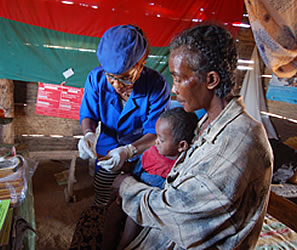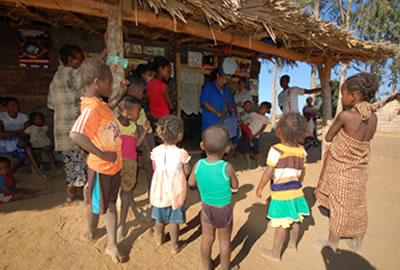On the day of the visit, Pelandrova examined a three-year-old boy suffering from a high fever. The boy tested positive for malaria, so Pelandrova treated him with artemisinin-based combination therapy (ACT), a highly effective and safe antimalarial treatment. After the treatment, she counseled the boy’s grandmother on the importance of having him sleep under a mosquito net regularly. Pelandrova also discussed the need to seek care early, during the critical hours when malaria symptoms first begin, since prompt treatment will prevent serious complications or even death. With severe cases, Pelandrova refers patients to the nearest basic health center or centre de sante de base (CSB).
Pelandrova explained that in the past few months she has seen a rise in the number of children under the age of five testing positive for malaria. She believes one reason for this increase could that her health services are more accessible now that she has her own work site. Pelandrova explains that she also receives patients referred to her from the CSB since the CSB sometimes runs out of rapid diagnostic tests (RDTs) for malaria testing.
On a recent “weighing day” at Pelandrova’s work site, a day when parents bring their infants to be weighed, Pelandova continued to educate her community on malaria prevention and other healthy behaviors. As she weighed the children, Pelandrova gave counseling on malaria prevention, nutrition, and other key health messages for pregnant women and children under the age of five.
The bike that Pelandrova received from MAHEFA not only makes her commute to and from work more manageable, but also enables her to make house visits to areas that are too far to reach by foot. Pelandrova also uses her bike to attend monthly CSB meetings, during which she has received additional training on correct use of RDTs and ACTs. “I regularly attend the monthly centre de sante de base meetings,” she explains. “They give me the opportunity to meet with other community health workers and to learn from their experiences.”
Community health workers like Pelandrova play a critical role in supporting the provision of basic health-care. By building the capacity of CHWs and supporting them with equipment and supplies, MAHEFA helps CHWs to recognize malaria symptoms, diagnose using a rapid test, and treat children for malaria.


